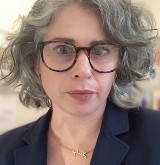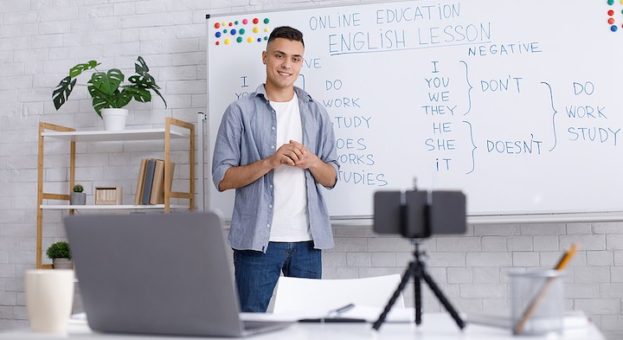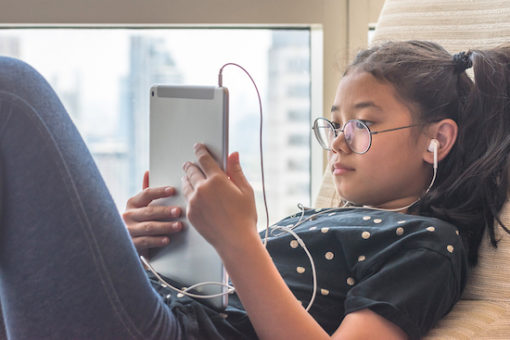Producing a ten years back, Jody Passanisi and Shara Peters questioned if on the web learning could substitute actual physical faculty. Now as they appraise the expenses to college students of pandemic driven schooling, the lecturers turned college leaders have their solution: Articles in a human vacuum just can’t maintain by itself.
By Jody Passanisi and Shara Peters
Pretty much 10 several years in the past, we requested the subsequent query, which was, at the time, hypothetical:
“Could an on the web learning process switch a classroom?”
In a 2012 article for Scientific American, we answered our very own problem: “Yes, it could. Will it? Most undoubtedly not.”

Jody
When we wrote this, we had been classroom instructors, prognosticating about the 2012 zeitgeist of concern among educators: so significantly technology. Certainly, at the time it felt like we were using a big wave of new technological innovation initiatives. In a rush to adopt these new equipment, several educators were being employing the applications for the tools’ have sake, not seeking their craft to surface out-of-date.

Shara
Others balked at the encroachment of tech resources onto their training territory. The problem was in the air: could that technological know-how finally make lecture rooms and the in-man or woman classroom studying expertise obsolete? What would that signify for schooling?
At that time we strongly felt that – no, even as technological innovation improves exponentially, lecture rooms will not be changed. We have now lived by way of a time time period that brought on us to dilemma the intent and strategy of all the things we do, and that also threw us into the arms of technologies as a essential usually means to education’s finishes.
Ten several years and one pandemic later, the globe has provided us a possibility to test our idea. We have viewed what is dropped when we do not have access to the brick-and-mortar school rooms. We have felt the oxygen go away the place at the idea of heading back again to on the internet understanding, even for a couple times.
Most students and educators across the nation professional this to different levels throughout the pandemic. It will be several years before we recognize the depths to which students had been impacted from this paradigm change in their education.
Our Reasoning in 2012
10 decades back we laid out a simple argument for why on the internet mastering wouldn’t completely stage out in-human being finding out. The foundation of our argument was as follows:
● School rooms are not just for disseminating data: college students require to learn expertise to unpack that data – consider it, examine it and create their own understandings.
● In purchase to do all of the higher than, pupils have to have to be equipped to collaborate with other students and their teachers.
● Our economic climate is primarily based extra on support and encounter-to-confront or at least interpersonal interactions instead than on production college students will need to have the expertise to collaborate with many others.
● Instruction (of more youthful learners specifically) is as significantly about finding out how to be a human being in the earth as it is about gaining educational awareness and techniques.
● Instructors are an priceless resource and have been given that endlessly replacing lecturers with tech would be preposterous.
Now that the concern is no for a longer time a hypothetical, we can securely say that we concur with all of the earlier mentioned – and a lot more.
Present Reasoning: Reflections from a Pandemic
Social and Emotional
A lot of students wilted during on-line finding out. This isn’t to say that some little ones did not take pleasure in or even prosper academically throughout distance finding out, but they had been in the minority. Matters that we all took for granted in advance of the pandemic – passing persons in the corridor, declaring a transient howdy, just staying about other people today – all of these matters were being long gone. Learners have been studying in a social vacuum.
One mitigating factor have been breakout rooms, which allowed college students to interact with every other in small groups. But some students were so self-conscious on these virtual platforms that they could not transform on their cameras. And numerous pupils understood, deep in their gut, that this was just not natural. It created it tricky for them to purchase in.
Early experiments of the outcomes of the pandemic clearly show that remaining young (underneath 18) was a risk factor for enhanced psychological health challenges (WHO, 2022). Students who are utilised to remaining close to friends and trustworthy grownups at university were being missing a crucial component of their assistance program. Looking at individuals by a monitor, while far better than nothing, is no substitute for remaining in-human being.
In the course of the pandemic students professional a mental health crisis with self-studies of stress and depression doubling through that time (Richtel, 2021). On-line faculty just can’t be blamed for all of that boost – the pandemic alone introduced about other challenges and major worries that influenced mental overall health – but we can be certain that the format of online education contributed to this increase.
Kinesthetic alternatives
Students are not meant to sit for 8 hrs straight. As considerably as we experimented with to mitigate students’ sum of time in entrance of a monitor by assigning asynchronous perform, it all arrived down to staying near to a display – college students doing work on a gadget – even if not in an online class at the time.
Learners who wished to hook up to their good friends would also chat on-line or video game on-line. At the end of the working day, learners would have a glazed glance in their eyes. PE was a problem on these online discovering platforms – learners would need to have to be pushed to go outside – even if they lived in an spot in which they have been capable to safely and securely go outside the house or had PE as an supplying in a length learning environment.
For some learners, the major exercise and movement they encounter is in college – and on the net school is the antithesis of motion no subject how quite a few Go Noodle, Simon Says, or other innovative physical exercise and mind-break routines academics built or made use of creatively during the pandemic.
Interpersonal Abilities
All of the smaller and big social interactions that learners have in a working day enable them to learn how to be in the entire world with other folks. These interactions are not often very simple. Teachers, directors, and other instruction industry experts are there to facilitate university student mastering in this regard: when an concern comes up among college students, academics can give the students instruments to resolve the difficulty and help mediate issues.
Without these alternatives to master from interpersonal interactions, students keep on being in their very own solipsistic bubble, not being challenged by many others – and finally, not mastering these crucial interpersonal skills.
In the pretty tightly structured online classroom, interactions are prepared – and quite seldom by happenstance as would be the case for an interaction on the playground or the basketball court. Also: on the internet, students never have the pure anchors of in-person studying. Strolling absent in the bodily world is substantially more durable than turning off your display.
Entry
All of these concerns were, in some techniques, problems confronted by the privileged. Quite a few learners throughout the state did not have significantly accessibility to technology, which resulted in studying loss and isolation. There is not still fairness in phrases of technologies and what’s obtainable for ALL college students.
Teachers
We are equally administrators in independent colleges in California. Supporting our teachers, and of class our college students, in the course of the pandemic was of the highest great importance. The activities of 2020 and 2021 burnt out our educators (Schabram & Heng, 2021). The pressures of hybrid classrooms (the place both equally online and in-human being learners are current), Covid protocols, Covid fears, and the lack of normalized connections in between colleagues and learners were being all a “motivation suck.”
To have on-line school rooms, you need on the internet teachers – and just after this working experience, when acquiring an on the internet choice can be unbelievably helpful with well being emergencies or inviting guests into classrooms, and other conditions of the extenuating assortment – lecturers are probably not lining up to train in this structure.
Unintended Implications of On line Understanding
As administrators, we are deeply aware that students engage with tech differently now than they did just before the pandemic. Center grades learners figured out early on that they could binge view Netflix through class, and lecturers experienced a tougher time catching them. They got totally employed to being in a position to message pals and lookup for material with no checks. They experienced backchannels on Discord and had been a lot more adept at acquiring close to written content blocks.
Eventually, they developed the routine of splitting their emphasis among a number of distinct electronic stimuli, all of which are designed to activate their dopamine concentrations extra commonly and simplistically than university and people critical understanding things to do that have to have much more sophisticated engagement.
The range of undesirable tech practices students picked up is also fantastic to list listed here, let by yourself the articles they ended up exposed to that was past trainer and family regulate. Now that they are back in the classroom, we see learners who are not able to keep away from multitasking. Alongside with that, we uncover an improve in technological know-how-similar infractions.
Resets are important but complicated to enforce as students’ tech use is normally furtive, the two at household and in the classroom. Students’ brains are not formulated more than enough, nor do they have all the competencies and equipment, to have unfettered accessibility to the World wide web, video games, and social media.
The absence of brick-and-mortar school rooms has also led to college students who have dropped even much more of a sense of an consciousness of other people further than what’s developmentally envisioned. Little ones have to have so much additional prompting to clean up up just after on their own, to take treatment of their classroom and university community.
Lecturers need to have to re-educate specified basic group techniques that aid learners to bear in mind that they need to have to believe right before they converse, be knowledgeable of men and women all around them, just take duty for their steps, and search out for other customers of their communities.
All of these so-named “soft skills” along with empathy, self-regulation, and neighborhood obligation are cornerstones of classroom curricula. And when on the internet mastering enables for the supply of material, albeit not automatically in the most partaking way, there are tiny to no alternatives for pupils to practice these other techniques in community.
Can on the net discovering switch the classroom? Here’s the 2022 respond to to the 2012 issue: No. Not if we want students to expand up to care about the local community and the planet all around them, and to be adept at moving as a result of the earth with a modicum of self- and other-recognition.
Closing Thoughts
We are not declaring that there isn’t a place for technological innovation in the classroom – we are large proponents of purposeful tech use à la the SAMR product (Puentedura, 2006). On the other hand, we have now tried the on line classroom method, and, when evaluating that knowledge to in-human being faculty, those gains of in-person schooling – social connections, emotional support, interpersonal interactions, sense of responsibility to self and group and physical movement – can’t be overstated, especially for young pupils.
Actually, finding out is not just about information and content – it’s the interactions that solidify that mastering. It is the thoughts of currently being around persons, in group, that can make it possible for students to find out about them selves and one particular one more. Content in a human vacuum just can’t maintain by itself. We’ve found the potential of on the net finding out – and it is just not enough for a full education.
Performs Cited
Passanisi, J. and Peters, S. (2012, June 28). Instructors and directors, do not be worried of technological know-how: It won’t switch the classroom. Scientific American Site Network. Retrieved March 7, 2022, from https://blogs.scientificamerican.com/guest-site/teachers-and-administrators-dont-be-frightened-of-technological innovation-it-wont-substitute-the-classroom/
Puentedura, R. (2006, August 18). Transformation, Engineering, and Education and learning. Retrieved March 7, 2022, from http://hippasus.com/sources/tte/
Richtel, M. (2021, December 7). Surgeon basic warns of Youth Mental Overall health Crisis. The New York Moments. Retrieved March 7, 2022, from https://www.nytimes.com/2021/12/07/science/pandemic-adolescents-melancholy-anxiety.html
Schabram, K., & Heng, Y. T. (2021, April 28). Educators and College students Are Burned Out. These Techniques Can Support. Harvard Company Publishing Education and learning. Retrieved March 7, 2022, from https://hbsp.harvard.edu/inspiring-minds/educators-and-pupils-are-burned-out-these-procedures-can-enable
World Wellness Firm. (2022, March 2). Mental wellbeing and covid-19: Early evidence of the pandemic’s impression. who.int. Environment Health and fitness Corporation. Retrieved March 8, 2022, from https://www.who.int/publications/i/item/WHO-2019-nCoV-Sci_Short-Psychological_well being-2022.1

Shara Peters is the Standard Studies Principal at Pressman Academy in Los Angeles and has formerly held roles at faculties in Southern California such as Trainer, Curriculum Director, and Head of School. She has created about training for Scientific American and Education Week, and co-hosted a podcast, “Find Oneself a Teacher,” alongside with Jody Passanisi. Shara was a 2019 receiver of the Pomegranate Prize from the Covenant Basis, a national leadership award given to Jewish educators for exceptional assistance as emerging professionals in settings throughout the place.
Jody and Shara were being the originators of MiddleWeb’s Future of Background website. Come across their posts here.



